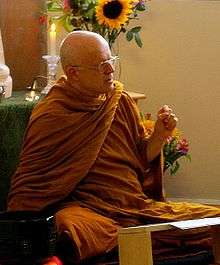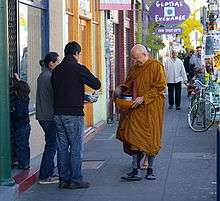Thanissaro Bhikkhu
| Ṭhānissaro Bhikkhu | |
|---|---|
 Ajaan Geoff giving a Dhamma Talk | |
| Religion | Theravada Buddhism |
| Lineage | Thai Forest Tradition |
| Education | Oberlin College |
| Personal | |
| Nationality | American |
| Born | 1949 |
| Senior posting | |
| Based in | Metta Forest Monastery |
| Title | Taan Ajahn |
| Rank | Phra Racha Khana (Chao Khun) |
| Religious career | |
| Teacher |
Fuang Jotiko, Phra Ajahn, Suwat Suvaco, Phra Ajahn |
| Present post | Treasurer, Dhammayut Order of the US |
| Website | www.watmetta.org |
Ṭhānissaro Bhikkhu, also known as Ajaan Geoff (born 1949), is an American Buddhist monk. Belonging to the Thai Forest Tradition, for 22 years he studied under the forest master Ajahn Fuang Jotiko (himself a student of Ajaan Lee). Since 1993 he has served as abbot of the Metta Forest Monastery in San Diego County, California — the first monastery in the Thai Forest Tradition in the US — which he cofounded with Ajahn Suwat Suvaco.[1]
Ṭhānissaro Bhikkhu is perhaps best known for his translations of the Dhammapada and the Sutta Pitaka - almost 1000 suttas in all - providing the majority of the sutta translations for the reference website Access to Insight,[2] as well as for his translations from the dhamma talks of the Thai forest ajahns. He has also authored several dhamma-related works of his own, and has compiled study-guides of his Pali translations.[3]
| Thai Forest Tradition | ||||||||||||||||||||||||||||||||||||
|---|---|---|---|---|---|---|---|---|---|---|---|---|---|---|---|---|---|---|---|---|---|---|---|---|---|---|---|---|---|---|---|---|---|---|---|---|
 | ||||||||||||||||||||||||||||||||||||
| Ajahns | ||||||||||||||||||||||||||||||||||||
|
||||||||||||||||||||||||||||||||||||
| Related Articles | ||||||||||||||||||||||||||||||||||||
Biography
| Part of a series on |
| Western Buddhism |
|---|
 |
|
Main articles |
|
|
|
|
|
|
General Buddhism
|
Early life
Ṭhānissaro Bhikkhu was born Geoffrey DeGraff in 1949 and was introduced to the Buddha's teaching on the Four Noble Truths as a high schooler, during a plane ride from the Philippines.[3] Tricycle writes: "he grew up 'a very serious, independent little kid", spending his early childhood on a potato farm on Long Island, New York, and later living in the suburbs of Washington, D.C.[4]
Time at Oberlin
At Oberlin College in the early 1970s, "he eschewed campus political activism because 'I didn't feel comfortable following a crowd.' For him, the defining issue of the day wasn't Vietnam, but a friend's attempted suicide."[4] Thanissaro took a religious studies class when he found out there was meditation involved. Thanissaro writes: "I saw it as a skill I could master, whereas Christianity only had prayer, which was pretty hit-or-miss."[4]
First trip to Thailand
After graduating in 1971 with a degree in European Intellectual History from Oberlin College, he traveled on a university fellowship to Thailand. After a two-year search Thanissaro found a forest teacher — Ajaan Fuang Jotiko, a Kammatthana monk who studied under Ajahn Lee Dhammadaro — who insisted that his scholarly American student put his books aside.
After a brief stay with the teacher was cut short by malaria, he returned to the U.S. to weigh the merits of academia and monasticism.
Return to Thailand
Thanissaro states that when he returned to Thailand he originally planned on becoming a monk tentatively for five years. When he said that he wanted to be ordained, Ajahn Fuang made him promise to either "succeed in the meditation or die in Thailand. There was to be no equivocating."[5] Thanissaro felt certain upon hearing this.
Time with Ajahn Fuang
By Thanissaro's third year ordained as a monk, he became Ajahn Fuang's attendant. Ajahn Fuang's case of psoriasis deteriorated. It reached a point where Taan Geoff had to be at his side constantly.
Thanissaro writes: "When I talked with Ajahn Fuang about going back to the West, about taking the tradition to America, he was very explicit. 'This will probably be your life's work,' he said. He felt, as many teachers have, that the forest tradition would die out in Thailand but would then take root in the West."[5]
Posting at Wat Metta
Before Ajaan Fuang's death in 1986, he expressed his wish for Ajaan Geoff to become abbot of Wat Dhammasathit. Thanissaro says that in spite of Ajahn Fuang's wish there were a lot of people maneuvering to become abbot. After Ajahn Fuang died, Wat Dhammasathit had already come far from the outlying forest hermitage that Taan Geoff had once arrived at. Thanissaro said: "Ajahn Fuang said to keep moving; this is not a tradition that works well in big groups." Taan Geoff declined the offer of abbot of Wat Dhammasathit, which came with strings attached, and no authority since he was a Westerner in a monastery founded by and for Thai monks.
Instead of taking that position, he travelled to San Diego County in 1991, upon request of Ajaan Suwat Suvaco, where he helped start Metta Forest Monastery.[3] He became abbot of the monastery in 1993.[6] In 1995, Ajaan Geoff became the first American-born, non-Thai bhikkhu to be given the title, authority, and responsibility of Preceptor (Upajjhaya) in the Dhammayut Order. He also serves as Treasurer of that order in the United States.
Teachings

Classical Buddhist modernism
Views on commentarial meditation practice
Thanissaro rejects the practice of kasina outlined in the Visuddhimagga, and warns against forms of "deep jhana" practiced by contemporary meditation teachers who draw from the commentaries. Thanissaro calls these meditations "wrong concentration", and says that they have no basis in the Pali Canon, which he argues should be considered ultimately authoritative.[7][8]
Forest as teacher and Buddhist counterculture
Thanissaro talks about the importance of the forest to give rise to the qualities of mind necessary to succeed in Buddhist practice.[9] Barbara Roether writes:
Like Thoreau, Thanissaro Bhikkhu has founded a kind of Walden as the Abbot of the Metta Forest Monastery near San Diego, the first Thai forest tradition monastery in this country. Just as the utopian movement in America was sparked by the advent of the industrial revolution, the forest tradition of Theravada Buddhism was developed in Thailand around the turn of the century by Ajahn Mun Bhuridatto in reaction to the increasing urbanization of the Buddhist monastic communities there. Forest monks abandoned the heavy social demands of the city and devoted themselves to meditation instead.[5]
Publications
Thanissaro Bikkhu's publications include:[10]
- Translations of Ajahn Lee's meditation manuals from the Thai
- Handful of Leaves, a five-volume anthology of sutta translations
- The Buddhist Monastic Code, a two-volume reference handbook on the topic of monastic discipline
- Wings to Awakening, a study of the factors taught by Gautama Buddha as being essential for awakening
- The Mind Like Fire Unbound, an examination of Upādāna (clinging) and Nibbana (Nirvana) in terms of contemporary philosophies of fire
- The Paradox of Becoming, an extensive analysis on the topic of becoming as a causal factor of dukkha (suffering)
- The Shape of Suffering, a study of patittasamuppāda (dependent co-arising) and its relationship to the factors of the Noble Eightfold Path
- Skill in Questions, a study of how the Buddha's fourfold strategy in answering questions provides a framework for understanding the strategic purpose of his teachings
- Noble Strategy, The Karma of Questions, Purity of Heart, Head & Heart Together, and Beyond All Directions, collections of essays on Buddhist practice
- Meditations (1-5), collections of transcribed dhamma talks
- Dhammapada: A Translation, a collection of verses by the Buddha
- And as co-author, a college-level textbook, Buddhist Religions: A Historical Introduction
Aside from Buddhist Religions, all of the books and articles mentioned above are available for free distribution; many are online. Audio recordings of Dhamma talks are also given freely.
Some teaching locations
- Metta Forest Monastery
- Portland Friends of Dhamma
- Barre Center for Buddhist Studies
- The Cambridge Insight Meditation Center
- Insight Meditation Center
See also
References
- ↑ Roether & Winter 1995.
- ↑ "Access to Insight: Translators". Access to Insight (Legacy Edition). Retrieved September 13, 2015.
- 1 2 3 Orloff, Rich (2004), "Being a Monk: A Conversation with Thanissaro Bhikkhu", Oberlin Alumni Magazine, 99 (4)
- 1 2 3 Tricycle 1998.
- 1 2 3 Roether 1995.
- ↑ "Contributing Authors and Translators: Biographical Notes". Access to Insight (Legacy Edition). Retrieved August 31, 2010.
- ↑ Quli.
- ↑ "Jhanas, Concentration, and Wisdom". DhammaTalks.net. Retrieved March 11, 2016.
- ↑ "The Customs of the Noble Ones". Access to Insight. Retrieved March 11, 2016.
- ↑ Bullitt, John (2007), "Thanissaro Bhikkhu (Geoffrey DeGraff)", Access to Insight, retrieved August 31, 2010
Bibliography
- Quli, Natalie (2008), "Multiple Buddhist Modernisms: Jhana in Convert Theravada" (PDF), Pacific World: 225–249
- Roether, Barbara (Fall 1995), Exile Spirit: A profile of Thanissaro Bhikkhu and the Metta Forest Monastery, Tricycle Buddhist Magazine
- Survival Tactics for the Mind: Thanissaro Bhikkhu speaks about tradition, sexism, and following the Buddha's rules, Tricycle Buddhist Magazine, Winter 1998
- Shankman, Richard (2008), The Experience of Samadhi: An In-depth Exploration of Buddhist Meditation (PDF), Shambala
- Thanissaro (2010), The Customs of the Noble Ones, Access To Insight
External links
| Wikiquote has quotations related to: Thanissaro Bhikkhu |
- Dhamma Talks and Writings of Thanissaro Bhikku
- Wat Mettavanaram Forest Monastery
- Suttas read aloud
- Audio archive from the Do It Yourself Dharma website
- Talks at AudioDharma
- Videos from Online Retreat on the Ten Perfections